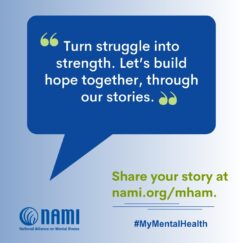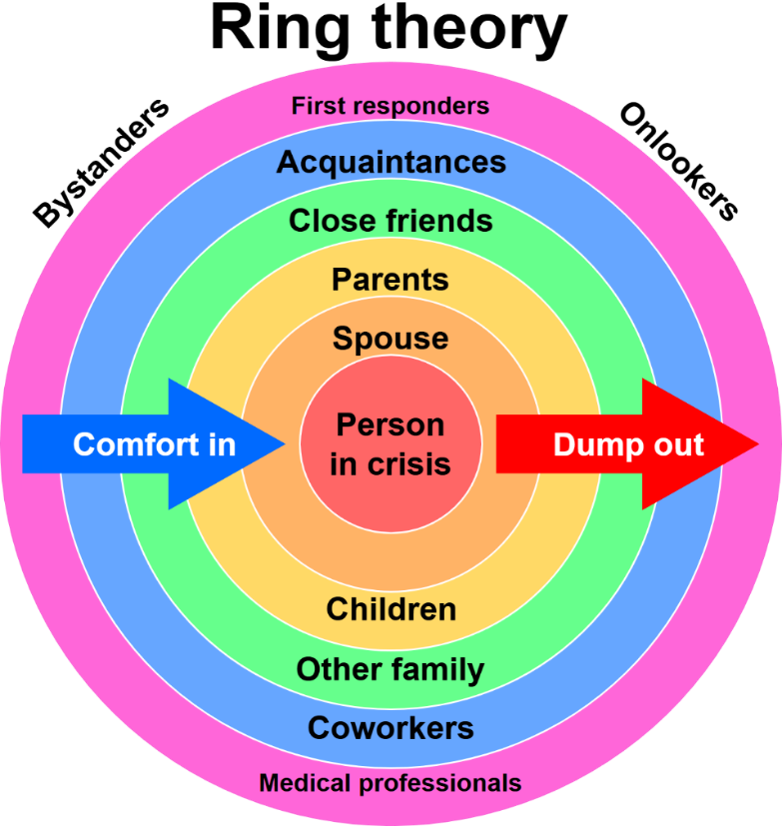 May is Mental Health Awareness Month – a time to take action, raise our voices, and help raise awareness about the importance of mental health. This year’s theme, “In Every Story, There’s Strength,” could not be more fitting. My story began when I was just ten years old, exposed for the first time to suicide – the death of a close friend’s sister. Decades later, I faced the devastating loss of Kathryn Howe Muntz, my wife, who died of suicide after a long and courageous battle with depression.
May is Mental Health Awareness Month – a time to take action, raise our voices, and help raise awareness about the importance of mental health. This year’s theme, “In Every Story, There’s Strength,” could not be more fitting. My story began when I was just ten years old, exposed for the first time to suicide – the death of a close friend’s sister. Decades later, I faced the devastating loss of Kathryn Howe Muntz, my wife, who died of suicide after a long and courageous battle with depression.
Mental illness is not an “I” or “me” problem. It’s a “we” problem. We experience it collectively: as individuals, families, coworkers, and communities. The stigma that surrounds mental illness often pushes people into silence, making it harder to seek help or to support others. Ironically, in shared experience, vulnerability, and connection, we find the strength to heal.
Over the years, I’ve learned that depression is not just a personal burden. It’s a family disease. It shapes relationships, routines, and perspectives. Despite my wife’s brilliance and contributions to research and education, she carried a private despair that eventually overwhelmed her. My daughters and I were left to pick up the pieces, walking a path through grief that, at times, felt unbearable.
There is no straight line through grief. Recovery doesn’t follow a schedule, and there are no shortcuts. But there is hope in community. Counseling, support groups, understanding coworkers, and small acts of kindness made an enormous difference in our lives. The courage to speak honestly, to say “she died of suicide” instead of using euphemisms helps dismantle stigma and invites others to share their own truths.
Counseling can be a lifeline in the midst of darkness. Whether individual, family, or group therapy, counseling offers a space to process pain, develop coping skills, and begin the healing process. For our family, professional help provided both stability and perspective during moments of intense vulnerability. It reminded us that we weren’t alone, that our feelings were valid, and that hope was possible. No one should have to navigate mental illness or grief without support. Counseling can give us tools to move forward, together.
One framework I’ve found especially helpful is Ring Theory, developed by psychologist Susan Silk and Barry Goldman. It teaches us how to offer support during times of crisis. Imagine concentric circles: the person at the center is experiencing the trauma. Each outer ring represents people further removed from the crisis. The simple rule is “comfort in, dump out”. Support flows inward, while personal venting or processing moves outward. In other words, don’t offload your emotions onto someone closer to the pain than you are. Instead, offer presence, listening, and practical help. Seek your own support elsewhere. Here’s a link to a September 2024 blog focused on Ring Theory.
Here’s a visual rendering of their theory:

That guidance would have helped me enormously when we were navigating my wife’s illness and its aftermath. Too often, people with the best of intentions say things that hurt more than help. “She’s in a better place.” “At least she’s not suffering.” These well-intentioned comments, while meant to comfort, can deepen the pain. Sometimes the most powerful thing you can say is simply, “I’m sorry.”
After my wife’s death, my daughters and I grieved in different ways, at different paces. One of the most powerful moments came when my younger daughter, Audrey, just nine months later, at her high school graduation gave a valedictory speech that directly addressed mortality and mental health. Her bravery opened eyes and hearts in that auditorium. My older daughter, Bella, has also spoken openly about her mother’s death, helping to change the conversation for others.
Support for mental health should be a part of every organization’s strategy. At StarBridge Advisors, a small HIT advisory firm, we believe in human support by showing up not just with our expertise, but with empathy. Behind every initiative is a person, and behind every person is a story. Creating spaces for those stories to be shared is part of our mission. We are advisors, yes, but we are also people, and that means lifting one another up when the burden is too great to carry alone.
Since my wife died, there’s one lesson I try to pass on every chance I get. Silence and stigma help no one. Speak up. Reach out. Offer help. Accept help. And remember, asking for help is not a weakness but an act of strength.
If you or someone you know is struggling, don’t wait. Call 988, the Suicide & Crisis Lifeline. Or text “NAMI” to 741-741 to connect with a trained counselor. Your voice, your presence, and your story matter.
Together let’s change the conversation. Together let’s change lives.
